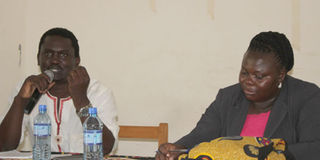Teachers, students urged to embrace African culture

Dr Jimmy Spire Ssentongo, the Centre for African Studies (CAS) chairperson and Ms Barbra Babweteera, the Cross Cultural Foundation of Uganda deputy executive director during the public lecture. PHOTO BY SADAT MBOGO
MPIGI. Teachers and students in all learning centers countrywide and across the continent, have been urged to always embrace African culture by following, teaching, learning and understanding customs, practices, places, objects, expressions, values and skills of a given community.
Dr Jimmy Spire Ssentongo, the Centre for African Studies (CAS) chairperson, said the African culture can be promoted through training of experts for culture, conducting research, advocacy, awareness and understanding of intangible cultural heritage.
“African culture is a natural resource that we have to avoid taking for granted. Let’s appreciate it before others do it for us. It is a source of revenue for our country’s economy to develop and it is through our culture that lasting peace can be achieved, promote health and conserve the environment,” he said.
He was speaking during a public lecture on Understanding and Promoting Intangible Cultural Heritage organized at Uganda Martyrs University (UMU), Nkozi Campus in Mpigi District.
He pointed out some threats to African culture like globalization, advancement of technology, contemporary religions and western form of education.
“Though we have these threats, we should ensure that we go for them but not forgetting to understand the role of intangible cultural heritage and conserve them for community development,” he added.
Ms Barbra Babweteera, the Cross Cultural Foundation of Uganda deputy executive director, also urged the government to put in more effort to preserve culture by giving support and protection to oral traditions and expressions, performing artists, social practices and festive events, knowledge and traditional craftsmanship.
“Let our government and all leaders think about culture as a steering for sustainable development goals. Promote indigenous languages in all institutions, support traditional music, dances, drama, festive events like Imbalu, and others like Kwanjula, Kuhingira, bone setting, pottery, traditional healing, and all cultural practices,” she said.
She also noted that overpricing Uganda’s heritage products and services has scared away culture promoters, thus advising all stakeholders to revise the prices.



